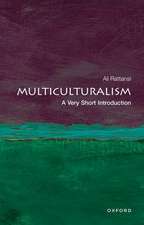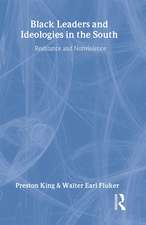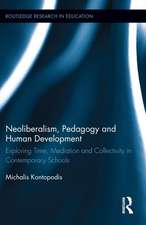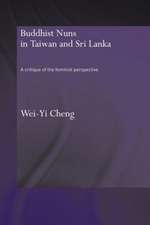Sino-Japanese Relations After the Cold War: Two Tigers Sharing a Mountain
Autor Michael Yahudaen Limba Engleză Paperback – 12 sep 2013
This textbook explores in detail the ways in which politics has shaped the thinking about history and identity in both China and Japan and explains the role political leadership in each country has played in shaping their respective nationalisms. Michael Yahuda traces the evolution of the relationship over the two decades against the framework of a rising China gaining ground on a stagnant Japan and analyzes the politics of the economic interdependence between the two countries and their cooperation and competition in Southeast Asia and in its regional institutions.
Concluding with an examination of the complexities of their strategic relations and an evaluation of the potentialities for conflict and co-existence between the two countries, this is an essential text for students and scholars of Sino-Japanese and East Asian International Relations.
| Toate formatele și edițiile | Preț | Express |
|---|---|---|
| Paperback (1) | 438.23 lei 6-8 săpt. | |
| Taylor & Francis – 12 sep 2013 | 438.23 lei 6-8 săpt. | |
| Hardback (1) | 930.77 lei 6-8 săpt. | |
| Taylor & Francis – 12 sep 2013 | 930.77 lei 6-8 săpt. |
Preț: 438.23 lei
Preț vechi: 515.56 lei
-15% Nou
Puncte Express: 657
Preț estimativ în valută:
83.87€ • 86.89$ • 69.99£
83.87€ • 86.89$ • 69.99£
Carte tipărită la comandă
Livrare economică 21 martie-04 aprilie
Preluare comenzi: 021 569.72.76
Specificații
ISBN-13: 9780415843089
ISBN-10: 0415843081
Pagini: 150
Dimensiuni: 174 x 246 x 18 mm
Greutate: 0.29 kg
Ediția:New.
Editura: Taylor & Francis
Colecția Routledge
Locul publicării:Oxford, United Kingdom
ISBN-10: 0415843081
Pagini: 150
Dimensiuni: 174 x 246 x 18 mm
Greutate: 0.29 kg
Ediția:New.
Editura: Taylor & Francis
Colecția Routledge
Locul publicării:Oxford, United Kingdom
Public țintă
Postgraduate and UndergraduateCuprins
Preface Introduction: Sino-Japanese Relations After the Cold War: Two Tigers Sharing the Same Mountain 1. Politics of History and Identity: From the Mao era to the early reform period of the 1980s 2. The Post Cold War Transformation: The 1990s 3. China’s Rise and Japan’s Decline 2000-2012 4. The Politics of Sino-Japanese Economic Interdependence 5. Partnership and Rivalry in Regional Institutions 6. Strategic Rivalry Conclusion: Looking Ahead
Recenzii
'Michael Yahuda’s extraordinary contributions to understanding Asia’s foreign relations reach a new milestone in this clear and comprehensive treatment of the region’s most important relationship. Detached and discerning analysis, adroit use of International Relations theories, and careful weighing of alternatives show a difficult path ahead, short of armed conflict.' – Robert Sutter, George Washington University, USA
'Michael Yahuda’s Sino-Japanese Relations After the Cold War: Two tigers sharing a mountain fills a persistent need for a solid textbook on Asia’s most important bilateral relationship. It is comprehensive in its scope, lucid in its conclusions, well balanced in its treatment of both history and new strategic realities, and always eminently readable.' – Richard Bush, The Brookings Institution, USA
'During the first two decades following the normalization of Sino-Japanese relations in the early 1970s, Japan and China managed to maintain amicable ties in spite of a relative lack of economic engagement and human exchanges. Since the early 1990s, however, the growing interdependence of the two countries has also been marked by underlying tensions and serious disputes as a long-term power shift from Japan to China occurs. Dr. Yahuda, a leading authority in the field, offers us a cogent and dispassionate analysis of the ways in which these two tigers can learn to share the same mountain.' – Ryosei Kokubun, President, National Defense Academy of Japan
'Focusing on China-Japan relations in the post-Cold War period, Michael Yahuda explains, with great skill, the historical, political, economic and strategic complexities of this most important East Asian bilateral relationship. In particular, he demonstrates how economic interdependence and a growing tripartite institutionalisation in Northeast Asia have thus far mitigated against conflict. Highly accessible, Yahuda’s insightful and balanced view offers us a refreshing antidote to the more alarmist interpretations of Sino-Japanese relations.' – Caroline Rose, University of Leeds, Executive Director, White Rose East Asia Centre, UK
'How can two tigers learn to share the same mountain? This is the key question Professor Michael Yahuda tries to answer his brilliant book. Among its strengths are its historic approach, which proves very useful for understanding the evolution of China-Japan relations, and its attempt to cover all areas (such as economy, international institutions, and strategic fora) in which the two countries interact.' Claudia Astarita, The International Spectator
'Michael Yahuda’s Sino-Japanese Relations After the Cold War: Two tigers sharing a mountain fills a persistent need for a solid textbook on Asia’s most important bilateral relationship. It is comprehensive in its scope, lucid in its conclusions, well balanced in its treatment of both history and new strategic realities, and always eminently readable.' – Richard Bush, The Brookings Institution, USA
'During the first two decades following the normalization of Sino-Japanese relations in the early 1970s, Japan and China managed to maintain amicable ties in spite of a relative lack of economic engagement and human exchanges. Since the early 1990s, however, the growing interdependence of the two countries has also been marked by underlying tensions and serious disputes as a long-term power shift from Japan to China occurs. Dr. Yahuda, a leading authority in the field, offers us a cogent and dispassionate analysis of the ways in which these two tigers can learn to share the same mountain.' – Ryosei Kokubun, President, National Defense Academy of Japan
'Focusing on China-Japan relations in the post-Cold War period, Michael Yahuda explains, with great skill, the historical, political, economic and strategic complexities of this most important East Asian bilateral relationship. In particular, he demonstrates how economic interdependence and a growing tripartite institutionalisation in Northeast Asia have thus far mitigated against conflict. Highly accessible, Yahuda’s insightful and balanced view offers us a refreshing antidote to the more alarmist interpretations of Sino-Japanese relations.' – Caroline Rose, University of Leeds, Executive Director, White Rose East Asia Centre, UK
'How can two tigers learn to share the same mountain? This is the key question Professor Michael Yahuda tries to answer his brilliant book. Among its strengths are its historic approach, which proves very useful for understanding the evolution of China-Japan relations, and its attempt to cover all areas (such as economy, international institutions, and strategic fora) in which the two countries interact.' Claudia Astarita, The International Spectator
Descriere
This textbook explores in detail the ways in which politics has shaped the thinking about history and identity in both China and Japan and explains the role political leadership in each country has played in shaping their respective nationalisms. Michael Yahuda traces the evolution of the relationship over the two decades against the framework of a rising China gaining ground on a stagnant Japan and analyzes the politics of the economic interdependence between the two countries and their cooperation and competition in Southeast Asia and in its regional institutions.
Concluding with an examination of the complexities of their strategic relations and an evaluation of the potentialities for conflict and co-existence between the two countries, this is an essential text for students and scholars of Sino-Japanese and East Asian International Relations
Concluding with an examination of the complexities of their strategic relations and an evaluation of the potentialities for conflict and co-existence between the two countries, this is an essential text for students and scholars of Sino-Japanese and East Asian International Relations
























